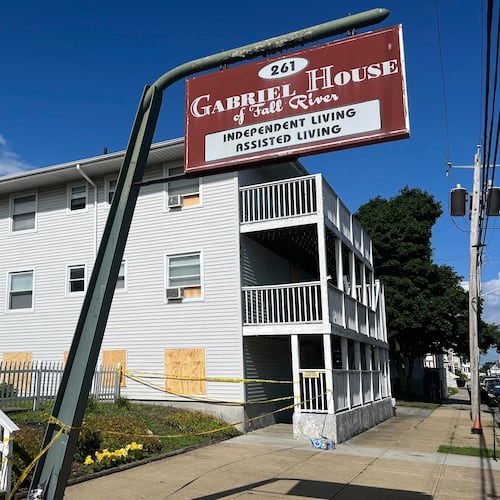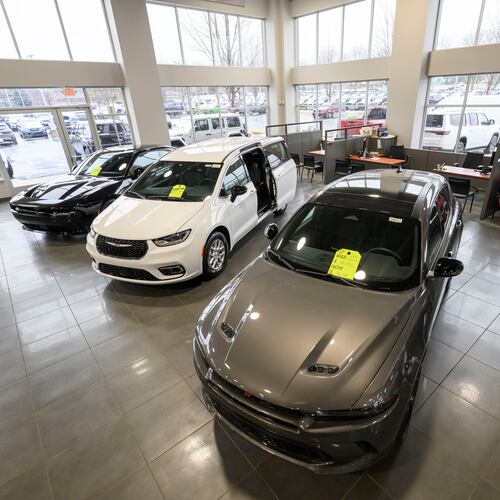JACKSON — Down an unmarked dirt road in this rural town between Atlanta and Macon, a massive metal shed quietly sits over part of a Norfolk Southern train track.
But each time a train whooshes through, that shed comes alive with stadium lights as dozens of cameras take a thousand pictures of it — to try to spot defects that could lead to catastrophe.
It’s been more than two years since a fiery derailment in rural Ohio made Norfolk Southern and the village of East Palestine household names for all the wrong reasons. The crash and chemical plume forced the town to evacuate, and residents still fear long-term effects of pollution.
Norfolk Southern executives were called before Congress, and the company was subjected to federal investigations, lawsuits and billions in costs.
The railroad says these sheds, or “portals,” are an example of how it has changed the way safety fits into its business model since.
The Atlanta company has spent hundreds of millions of dollars on the task, from more detectors and inspection technology to a retooling of its training. It’s all to instill what it calls a new safety culture at the nearly 200-year-old company, which, before the the derailment, had the fastest-growing accident rate in the industry.
The February 2023 derailment was a wake-up call for Norfolk Southern and the industry. But for some, the incident — which a new lawsuit alleges caused a half-dozen deaths because of the subsequent environmental disaster — sadly wasn’t a surprise.
“All of rail labor was sounding the alarm for everybody that something bad was inevitable, and there it was,” said Jared Cassity, chief of safety at the SMART Transportation Division union, Norfolk Southern’s largest.
“That shook Norfolk Southern to the point where they had to show the world that they were making changes.”
The changes the railroad has made, he says, are real. But without federal enforcement, Cassity and others are worried that once attention shifts away, things will regress.
A proposed railroad safety bill is held up in Congress, despite support from Vice President and former Ohio senator JD Vance.
East Palestine was “a major public relations disaster that was going to happen to some railroad, because this goes on every day,” said Hugh Sawyer, a nearly four-decade veteran engineer of Norfolk Southern. “Although what happened, in my opinion, happened because we had cut corners.”
From 2018 to 2022, the railroad’s rate of accidents per million train miles rose faster than any of its competitors, according to federal data.
Norfolk Southern and its competitors had for years been under fire from unions over precision scheduled railroading or PSR, an operating model designed to improve profits by maximizing efficiency. Advocates said PSR often came at the cost of safety.
An ongoing shareholder lawsuit alleges Norfolk Southern “systematically dismantled the company’s safety infrastructure in an all-out pursuit of profits.”
Norfolk Southern Chief Safety Officer John Fleps, who took the role the month after the derailment, told The Atlanta Journal-Constitution that the company is now following “PSR 2.0,” which entwines safety and “operational excellence.”
“You cannot have one without the other,” something he acknowledged “has not been reinforced historically.”
Whether that’s employees getting injured or a derailment stopping operations, unsafe practices are also inefficient, Fleps said.
The new model is showing results. The company has the lowest mainline train accident rate in the industry (excluding yard incidents), he said.
Its overall train accident rate has also dropped since 2022, according to federal data.
“And we’re just getting started,” Fleps said.
Credit: arvin.temkar@ajc.com
Credit: arvin.temkar@ajc.com
‘Could not have been worse’
Before the derailment, Norfolk Southern “was one of the worst railroads in the country, hands down,” said Cassity, who advocates for rail safety on behalf of union members across railroad companies in Washington, D.C.
“Their approach to safety, their approach to training, could not have been worse, in my opinion,” he said.
A resignation letter from a former Norfolk Southern employee in 2021, one of dozens compiled by another union, TCU, alleged the company’s conditions had become “beyond dangerous” after the new emphasis on efficiency.
“Your policies and focus on driving up the stock price is putting the general public in grave danger,” former employee Aaron Mattingly wrote at the time.
“They’re threatening to go from worst to first,” said Rick Paterson, a rail industry analyst with Loop Capital. “It’s actually a pretty interesting redemption story.”
In the 11 years before East Palestine, the railroad saw three systemwide meltdowns — the industry’s worst rate, he said. But since 2023 Norfolk Southern has “been improving fairly dramatically” both in terms of accident rates and in terms of service, he said.
For example, after recent outages from hurricane-caused flooding, the railroad’s train speeds bounced back quickly, Paterson said.
Regardless of whether a railroad is using PSR or not, he said, “There’s a strong correlation between safety and operating quality.” When a railroad runs well, accident rates go down, and vice versa, he said.
Credit: arvin.temkar@ajc.com
Credit: arvin.temkar@ajc.com
The 2023 East Palestine incident, caused by an overheated bearing, happened in part because the company’s operating procedures and detector network didn’t give the crew adequate warning to stop the train, according to the National Transportation Safety Board.
But the company also made a “flawed” decision after the derailment, NTSB said, to burn off a toxic chemical in some of its tank cars in order to avoid an explosion. How the company communicated with first responders about the hazards of the train’s cargo was also widely scrutinized.
Cassity said the quality of Norfolk Southern’s training program came under the microscope quickly.
A 2023 Federal Railroad Administration safety culture assessment found the company was still using minimum standards in some areas a few months after the derailment.
Since East Palestine, the railroad has for the first time opened up its program to input from unions — as well as federal regulators. Most suggestions, Cassity said, were accepted.
He says training changes have also improved the company’s self-reported injury rates, which are below 2019 and 2020 peaks.
While the rate has ticked up slightly since 2022, Cassity said that’s reflective of a positive trend: increased employee willingness to report their injuries.
Credit: arvin.temkar@ajc.com
Credit: arvin.temkar@ajc.com
A ‘transformation’
Norfolk Southern trains all of its employees, thousands annually, in McDonough, southeast of Atlanta.
And that’s where the company’s efforts to revolutionize its safety culture begins, explained Jason Myers, the company’s director of technical training, who also took his role shortly after East Palestine.
Myers said feedback from unions and regulators prompted Norfolk Southern to extend training from a nonconsecutive, four-week program with a monthlong break in the middle to a continuous five-week one.
While the railroad is not required to solicit outside opinions, which concerns the unions, Myers argues doing so “is the right business choice.”
“Selfishly (it) means I have to change the program less if we’re getting it more right the first time,” he said.
Other recent training changes include covering safety metrics “from Day 1,” he said. “That wasn’t something that we had historically done.”
Sawyer, the Norfolk Southern engineer, said among existing employees, he’s noticed new safety messaging, including the company “highly publicizing” employees’ right to stop work for a safety concern.
He has noticed that train master managers now start shifts by reviewing recent safety incidents with crew members.
Credit: arvin.temkar@ajc.com
Credit: arvin.temkar@ajc.com
There’s also an application on their company phones that allows employees to either confidentially or publicly flag safety issues, he said.
The company was the first to join the Federal Railroad Administration’s independent, voluntary Confidential Close Call Reporting program.
When it comes to its derailment responses, Fleps, the chief safety officer, highlighted a recent partnership with an emergency response tech company that immediately transmits cargo information to first responders. The railroad has also trained thousands of first responders for free.
As of this year, Norfolk Southern trainees also visit the company’s gleaming Midtown headquarters in an effort to empower them, Myers said.
And changes will keep happening, he said, “to meet the demands of our modern students.”
Today, that includes a mix of classroom work, virtual reality headsets and simulators, as well as work with real equipment on a rail yard.
“I can tell you, 20 years ago it was, ‘Get up on that ladder. Get off that ladder. Good, next.‘” Myers said. “We’ve come a long way since then, and we’re going to come a long way in the next 20 years too.”
Credit: arvin.temkar@ajc.com
Credit: arvin.temkar@ajc.com
Tech hits the track
Another revolutionary change the company has rolled out since 2023 — though it had been in the works since 2020 — is the use of digital train inspection portals like the one in Jackson.
These huge, multimillion-dollar metal sheds, developed with Georgia Tech, have dozens of cameras and stadium lights that take 360-degree images of a moving train. The pictures are fed through a machine learning algorithm to spot possible defects.
Specialists assess flagged images and, if needed, alert the train’s crew and employees.
The status quo, Fleps said, has been just the human eye and wayside detectors that measure things like temperature or vibration.
“Though our inspectors are professionals, there’s only so much that you can see when you’re walking alongside a train. You cannot see underneath. You can’t see on top,” he said.
“Cameras can do that, and they do it rain or shine, night or day,” he said. “They don’t get tired.”
The company has added seven portals since the first was installed near East Palestine in October 2023. There are plans for up to 20 to ultimately cover about 90% of its network, he said.
Credit: arvin.temkar@ajc.com
Credit: arvin.temkar@ajc.com
But the system is not foolproof. Norfolk Southern had a 19-car derailment in Attica, Ohio, leak ethanol just last month.
Fleps said its investigation is still underway, but he noted the train was 10 miles from reaching a portal, and “the conditions that we’re honing in on were visible through these cameras.”
He said the railroad may soon layer smaller, cheaper versions of the portals onto the network and its yards with more limited camera views.
Plus, engineers are working on a mobile version that attaches to the bottom of a train to monitor the state of the track, he said.
Credit: arvin.temkar@ajc.com
Credit: arvin.temkar@ajc.com
The Federal Railway Safety Act
But Cassity and other union leaders remain concerned that little requires railroads like Norfolk Southern to maintain these protocols once the headlines of East Palestine fade away.
That’s why they have been pushing for a bipartisan federal Railway Safety Act, which is stalled in Congress amid pushback from the industry, including Norfolk Southern.
Among other changes, the bill would increase standards for transporting hazardous materials and increase penalties for wrongdoing.
Fleps told the AJC that while the railroad supports “a lot of things” in the bill, “we don’t need a regulator to tell us” to make safety improvements.
The company last year added safety to the metrics that affect executive compensation.
Ron Kaminkow, a recently retired engineer and member of Railroad Workers United, told the AJC: “If they really believed in safety, they’d be out lobbying for the Railway Safety Act.”
The company’s progress “doesn’t necessarily mean it’s intrinsic now … or that the second that the public pressure and oversight lets up, they won’t immediately go back to just being a pretty irresponsible corporation,” he said.
Sawyer, the longtime Norfolk Southern engineer, believes there’s still pressure to move freight quickly while on the job, despite the changes.
“For most of my career there’s always been a public relations message out there that we’re all about safety, and I have not necessarily found that to be true,” he said.
He still sees “a desire at the corporate level to meet the stockholder expectation of more revenue, and less money spent getting that revenue.”
Fleps insists that even up to the executive level, the company is committed to keeping safety a “core value.”
Still, he said, Norfolk Southern knows it has to “prove to our people that that commitment is real.”
Credit: arvin.temkar@ajc.com
Credit: arvin.temkar@ajc.com
About the Author
Keep Reading
The Latest
Featured


